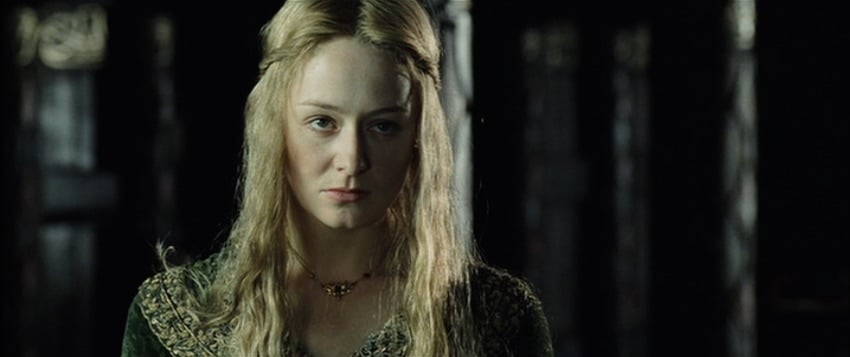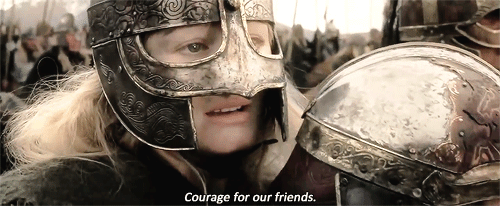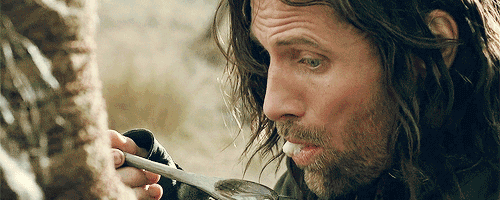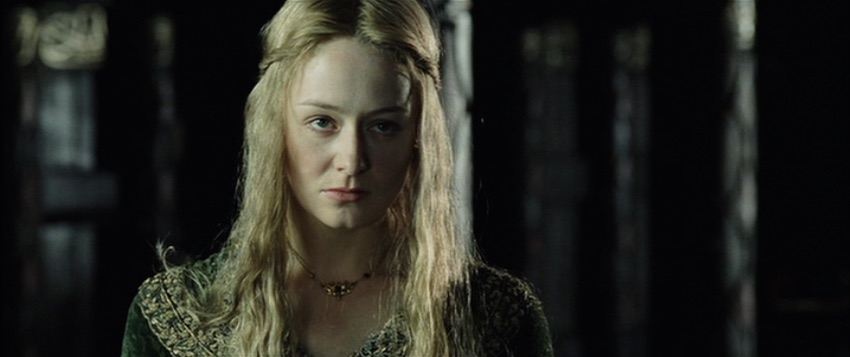There are many things I love about the Peter Jackson Lord of the Rings film adaptations. The attention to detail, the shout outs to uber nerds with Silmarillion refs, the way Legolas jumps up on that horse in The Two Towers. There’s a lot to really admire given the scope of the world and the fact that a large part of the story is following different groups of people wandering around and talking. It takes skill to adapt a work that was clearly never intended for film and make it compelling visually without losing the core of the story. I’m thrilled the films exist and I’m glad that, obsessive geek though I am, it wasn’t me tasked with making that come alive. I doubt very much I could have let go enough of my own feelings about it to do it proper justice.
Still, no adaptation of a work so beloved by so many can possibly match every person’s interpretation or expectation of it. And it would be unreasonable to expect it to. That said, there are some things I feel like the writers stumbled on and Eowyn is one of the big ones.
(Important note: Your personal mileage may vary widely on this sort of thing and if you loved movie Eowyn I am NOT trying to convince you otherwise. Stories are wonderful, powerful things, just like your personal reactions to them. Love what you love and never apologize for it!)
It says something to me that a WWI vet from a devout Catholic background wrote about a warrior woman in a book published in 1954 that was more feminist than her modern interpretation ended up being.
I know what you’re thinking. “But Eowyn kicked ass! She swung a sword and she fought the Lord of the Nazgûl! She said “I am no man!”
Yeah, I know. And look, I’d really like to tell you that that’s enough for me. But it isn’t. Let me explain why.
First, we need to go to the books. Eowyn in the books is a very cold, very unhappy, character. She’s been relegated to nurse maid to a sick uncle while her brother gets to go out and fight and do all the things she wants to do. Like have a life of any kind. While her brother loves her he kind of doesn’t pay attention to what’s going on with her at all. It never even occurs to him that maybe she’s not super psyched about watching over her sickly uncle all the time. He just assumes she’s cool with it because that’s what ladies do. It’s Gandalf who points out to Eomer, later, that maybe he should have thought about what it was like for her to be cooped up in Meduseld, watching her family disintegrate and the world fall apart. That she had no less of a fierce spirit than he does, just because she’s female. In the book, Eomer has a major realization after that, that he might not really have ever known his sister. This is a bit of a running theme when it comes to Eowyn.
Beyond being undervalued, Eowyn is also being stalked by a gross little man who is slowly poisoning her uncle’s mind and clearly expects to get her as a “reward” later. Eowyn isn’t stupid, she’s well aware of the danger she’s in and that she has basically no one to turn to if things go majorly south, especially once Eomer is banished. Her life is exactly what she most fears: a cage. She has a lot of very good reasons to feel trapped and bitter.
Enter Aragorn, who in the books is a lot more Arrogant Lordly Dude and a lot less Scruffy Nice Guy Reluctant Hero. In him she sees someone actually kingly, something her uncle hasn’t been in a long time. She sees a leader, someone with strength and resolve. Someone worth following into battle, which she longs to do, and maybe most notably: someone she’s not related to who isn’t tied to Rohan and the life she’s been forced to live there. She mistakes this for love but in reality it’s that she’s just so sick of wasting away and being told that her only purpose is as a doddering old man’s crutch, that he looks pretty good as a means of escape. For a while.
Now, once Gandalf fixes Theoden everyone goes off to do Important Things and sort of forgets about her. As per usual. Now that the king is better no one seems to consider what she wants out of life, what her hopes or dreams are, what she can contribute beyond helping the men be more manly. That’s got to chafe. In the book we see this much more clearly, that while Theoden has been restored to sanity, in many ways things haven’t changed for Eowyn much at all.
Still, while the films don’t go into all this nuance, we do get to see her caring for her dying cousin, dealing with Wormtongue, and the acknowledgement that life for ladies wasn’t exactly on equal footing. Unfortunately, once she meets Aragorn, things start to get wonky. Not because I have any problem with romantic storylines! I love them. And I especially love Tolkien’s particular brand of doomed, tragic, romance. Even the “happy” ones are going to end badly, as we see with Arwen.
My issue is with the way they had Eowyn moon over Aragorn in the films. And it hinges on a key scene from the book that they left out completely. In it, Aragorn tells Eowyn that she can’t come with him on The Paths of the Dead because her people need her and that renown isn’t really all it’s cracked up to be. He’s not wrong, exactly, but he basically tells her it’s her duty to stay behind, something he would never say to her uncle or brother.
And she calls him on it. Flat out. She tells him, “All your words are but to say: you are a woman, and your part is in the house. But when the men have died in battle and honour, you have leave to be burned in the house, for the men will need it no more. But I am of the House of Eorl and not a serving-woman. I can ride and wield blade, and I do not fear either pain or death.”
Think about that for a moment. Not only is she calling him out for sexism, she lays out why it’s sexist and does a pretty damn fine job of distilling down the lot of women in this culture. To whit: if there aren’t men around, you don’t really matter, and you definitely don’t get to decide for yourself how you live OR die if you’re a lady. That’s very powerful, especially in a series that deals a lot with the trappings of war and glory from a distinctly masculine point of view.
She doesn’t come even remotely close to saying anything like that in the film, instead pleading with him out of love, giving a lot of doe eyed looks, and generally being deferential instead of defiant. It undermines her character’s strength and feminist bent. Because although she thinks she’s in love with Aragorn she has no problem telling him he’s completely full of shit. Full of sexist shit, in fact.
This matters because A. Aragorn is one of the good guys and he’s still being a complete ass B. it shows that though Eowyn may have fuzzy feelings about him she is not some spineless, weepy, floormat begging for scraps of love. She’s not going to put up with crap from anyone. This seems incredibly central to her character to me and yet…it’s not even touched on in the film. The closest we get is the line about women in that country knowing that those without swords can still die upon them and fearing neither death nor pain…but it lacks the context and direct confrontation of sexism that the book provides.
This brings me to the scene with the Lord of the Nazgûl. In the film she’s terrified, which is understandable, but they stripped out the amazing speech she gives as, scared as she is, she stands up to only the second most awful creature in the series. Don’t forget, the Lord of the Nazgûl is Sauron’s second in command. Grown men cower at the sound of his voice. He stabbed Frodo at Weathertop. He even freaks out Gandalf.
So, this terrifying monster thing has just mortally wounded her uncle and she tells it where it can stick it in one of my favorite passages in the whole series.
“Begone, foul dwimmerlaik, lord of carrion! Leave the dead in peace!”
A cold voice answered: ‘Come not between the Nazgûl and his prey! Or he will not slay thee in thy turn. He will bear thee away to the houses of lamentation, beyond all darkness, where thy flesh shall be devoured, and thy shriveled mind be left naked to the Lidless Eye.”
A sword rang as it was drawn. “Do what you will; but I will hinder it, if I may.”
“Hinder me? Thou fool. No living man may hinder me!”
Then Merry heard of all sounds in that hour the strangest. It seemed that Dernhelm laughed, and the clear voice was like the ring of steel.
“But no living man am I! You look upon a woman. Éowyn I am, Éomund’s daughter. You stand between me and my lord and kin. Begone, if you be not deathless! For living or dark undead, I will smite you, if you touch him.”
This got distilled down to “I am no man.” Look, I know they couldn’t have just put this in verbatim, it’s got an old-timey cadence and they’d already tweaked other dialog to be less formal. But. There is so much more here than “I am no man.”
First of all, he didn’t just threaten her with death. He threatened her with horrifying, endless torture and mind rape, basically. And she laughs at him. And then she stabs him in the face. What’s more? She makes him afraid before she does it because up until then, he thought he was immortal. Whoops!
I think you lose a lot of important nuance by over simplifying it to “I am no man.”
Still, I could have lived with that except for what comes after.
See, in the book, she’s falls over onto her enemy because he’s so evil that his death nearly kills her. She’s found later on the battlefield and they think she’s dead. Eomer is incredibly upset (understandably) and ends up going off in a foul, suicidal mood, where he and the other riders chant “death, death, death” as they cut a swath through the enemy. It’s pretty bleak.
The movie, for no reason I can fathom, decides that Eowyn can’t just kill the Witch King. Nope. After this huge showdown she also needs to be chased by Tumor the Orc, an enemy we got introduced to that isn’t A. interesting B. even in the same category of terrifying as the Witch King. He’s completely beneath her as a foe at this point.
So far as I can tell he exists so that Aragorn can kill him and “save” her, without actually knowing he did so. Which is just…weird. Why would you have this amazing moment where Eowyn defeats an enemy literally no one else in Middle Earth could have…and then have her crawling away from a generic, malignant orc in the aftermath? And why does Aragorn need to save her? What does this do for either character? Other than undermine her achievement, of course.
It’s one of the most perplexing character and narrative choices/changes in the films. What’s more: I don’t think it occurred to anyone that, along with making her overly lovesick, they inadvertently damsel’d her. For me, it’s a frustrating example of casual sexism creeping in. It’s even more frustrating when you realize Tolkien, writing in a time that was quite a bit less progressive than now for women, did it better. Sticking closer to the original narrative and character would have solved this issue neatly. It stands out as pointless and tacked on.
After all of this, Eowyn ends up in the Houses of Healing and eventually meets Faramir. They develop a strong bond, one based on compassion and understanding, and we see that Faramir truly appreciates her for who she is. He knows she’s a warrior and a queen in her own right, he never talks down to her or treats her as less than his equal. We get a hint of this in the extended edition of Return of the King, and I know they didn’t really have time to do more. Yet I still miss that relationship because it says so much about both characters. Eowyn ends up discovering what real love is and finally being seen by someone for the amazing person she is.
I guess what bugs me most is that they took a legitimately “strong” female character, and by that I mean a complex, flawed, brave, and ultimately a triumphant warrior woman who has her own major arc…and reduced her down to something less than that. To me, strength in a character is about more than their ability to hit or kill things, and while Eowyn’s big moment is certainly defeating The Lord of the Nazgûl, it’s her defiance in the face of insurmountable odds that truly makes her “strong”. I wish the film version had honored that more.
Because that would have been honoring the proto-feminist character Tolkien created.
Mariah is a comic book writer, editor, and artist. You can find her on Twitter having long rants about Tolkien, pop culture, and tea. She likes cupcakes and cephalopods a lot.
Are you following The Mary Sue on Twitter, Facebook, Tumblr, Pinterest, & Google +?












Published: Jan 27, 2015 08:00 pm